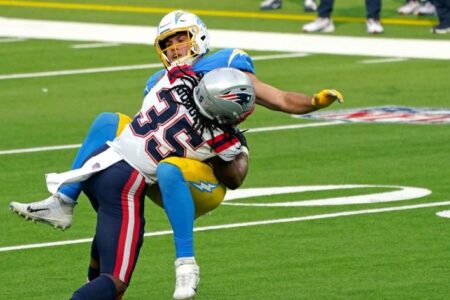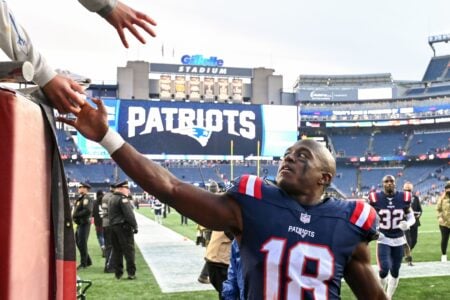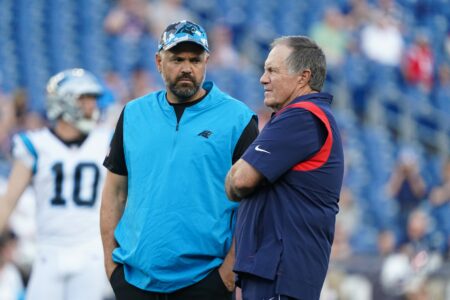- Joined
- Oct 10, 2004
- Messages
- 33,218
- Reaction score
- 44,411
Registered Members experience this forum ad and noise-free.
CLICK HERE to Register for a free account and login for a smoother ad-free experience. It's easy, and only takes a few moments.Did the Biffs coaching staff bring this up just after seeing the replay? looked like they just walked off the field without any questions. Coaches are always up in arms when they think the refs got something wrong, not in this case, maybe I missed something....
In the context of the discussion about argument from authority, which had been relied upon by a prior poster, yes. And as I mentioned above, this argument a terrible precedent: the league officials are arguing that a written rule can be interpreted by them to mean the exact opposite of its written text (i.e., "advance" now means "move backwards").
This mode of interpretation - ignoring the written text of the rule - is good for the refs and the league office but bad for the players. It's good for the refs and league office because it gives them complete power to make up rule interpretations however they want. They are not constrained by a book. It's bad for the players and for the game because now nobody can know what a rule actually means. They've just thrown out the rule book here.
They are not ignoring any rule, and everybody in the country knows what it means save an ever-shrinking minority in this forum.In the context of the discussion about argument from authority, which had been relied upon by a prior poster, yes. And as I mentioned above, this argument a terrible precedent: the league officials are arguing that a written rule can be interpreted by them to mean the exact opposite of its written text (i.e., "advance" now means "move backwards").
This mode of interpretation - ignoring the written text of the rule - is good for the refs and the league office but bad for the players. It's good for the refs and league office because it gives them complete power to make up rule interpretations however they want. They are not constrained by a book. It's bad for the players and for the game because now nobody can know what a rule actually means.
You're correct that's how the rule reads.The relevant rule is Rule 7, Section 2, Article 1(d)(1): "An official shall declare the ball dead ... when a runner declares himself down by: ... falling to the ground, or kneeling, and clearly making no immediate effort to advance".
This is the version on the NFL Rules site, 2015 NFL Rulebook | NFL Football Operations . An incorrect version of this rule, with incorrect wording and incorrect numbering, was quoted by another poster in another thread: Bills Post Game Thread | Page 4 | New England Patriots Forums - PatsFans.com Patriots Fan Messageboard .
Actually quoting the thread makes the issue clear. If the runner went down voluntarily and then clearly made no immediate effort to advance, then the ball is dead and the call is correct.
I do not understand how hundreds of media outlets and multiple posts here can opine about an issue without first of all quoting the correct rule. It's fine to have an opinion, but first, check the rule. Even the officials, in their rambling explanation, did not quote the rule (I agree with the officials' ruling, but not their explanation to the media, which should have quoted or cited the rule).
You're correct that's how the rule reads.
The only relevant question left is whether "advance" can only mean forward. The dictionary says yes. However that is not what the rule makers intended it to mean, that is not how it's ever been called, and that's not how players and refs understand the rule....And there's a good deal of evidence showing that is indeed how "advance" has historically been used in the NFL.
Any attempt to further claim he is trying to advance amounts to asking the ref to read the mind of the player.
You guys are writing a lot of words.
Fumble recoveries and muffed punts are one example where the player dives down then sometimes gets up and moves sideways or backwards first.I agree with your analysis if, in fact, your claim is correct that the word "advance" has historically been used in the NFL to include backwards or sideways motion. Can you adduce any specific evidence to support your claim? Has Rule 7, section 2, article 1(d)(1) been interpreted to allow a live ball after a runner has voluntarily fallen to the ground and clearly made no effort to immediately forward advance?
(By the way, "in advance of" is defined in the usual way, Rule 3, section 13, article 2: "a point nearer the goal line of the defense").
No, but that's because it's rare, and when it does happen the intentions are typically obvious as well- like MJD falling in the field of play before the end zone to continue running the clock. However, the fact that we can judge intentions easily doesn't mean the rule requires it, or that it's even necessary.Yeahhhhh.... no.
Does it take mind reading to know what Watkins was trying to accomplish by rolling out of bounds? Can you point to a single instance where a player gave himself up in the field of play and there was any dispute about what his intentions were?
But there's no reason to go down that rabbit hole.
In the case of the fumble recovery, for example, the runner is in fact intending to advance forward after recovering the fumble. Similarly for the punt return example. These are instances where the runner is attempting to move the ball forward, that is, attempting to advance. The QB example is presumably similar, although Rule 7(2)(1)(d)(1) seems to connote voluntarily falling rather than involuntarily, but that is not germane to this issue.Fumble recoveries and muffed punts are one example where the player dives down then sometimes gets up and moves sideways or backwards first.
I think I saw one last week where the QB tripped also, then jumped back up and went backward to complete the drop.
The rule doesn't include the runners intentions, it's irrelevant. Not that that helps your case.In the case of the fumble recovery, for example, the runner is in fact intending to advance forward after recovering the fumble. Similarly for the punt return example. These are instances where the runner is attempting to move the ball forward, that is, attempting to advance. The QB example is presumably similar, although Rule 7(2)(1)(d)(1) seems to connote voluntarily falling rather than involuntarily, but that is not germane to this issue.
Thus, Rule 7(2)(1)(d)(1) would not cause these to be ruled a dead ball even under the standard meaning of "advance" because in these examples the runner is intending to advance. As such, these examples do not support your claim that historically the term "advance" in the NFL Rules has included advancing sideways or backwards.
I suppose you could argue that in those instances the runner is not making an "immediate effort to advance", but that would not be correct: the effort is immediate, even if the advance itself does not come until later.
Do you have any instance where a player (a) WHO DOES NOT INTEND TO ADVANCE FORWARD and who (b) VOLUNTARILY FALLS WITHOUT CONTACT is ruled not to have declared a dead ball under Rule 7(2)(1)(d)(1)?
Rule 7(2)(1)(d)(1) requires that a fallen runner not make an immediate effort to advance for the ball to be dead. If the runner is not intending to advance, then he is not making an effort to advance, and vice versa, by definition. However, if it is clearer, you can disregard the references to intent in my previous post.The rule doesn't include the runners intentions, it's irrelevant. Not that that helps your case.
If you think "advance backward" is nonsense then don't claim the examples I gave of someone going backward are actually an attempt to advance. You can't have it both ways. I'm using the rule you posted. It didn't say to judge the runners intent. I gave several specific conditions where those two conditions were met yet the call has never been made that the runner was giving up.Rule 7(2)(1)(d)(1) requires that a fallen runner not make an immediate effort to advance for the ball to be dead. If the runner is not intending to advance, then he is not making an effort to advance, and vice versa, by definition. However, if it is clearer, you can disregard the references to intent in my previous post.
Thus, in the examples you gave to support your claim that Rule 7(2)(1)(d)(1) has historically been interpreted to mean that "advance" can mean "advance backwards", the runner is in fact making an effort to advance forward. Therefore, these examples do not support the claim that "advance" can mean "advance backward".
I can't believe I'm even writing "advance backward." You cannot advance backward, nor retreat forward, nor rise lower, nor descend higher, except in very bizarre, artificial situations that don't apply. I'm not even sure "advance backward" is grammatical, but if it is, neither you nor anyone else has put forth any evidence that this is what the rules intend by the word.
A runner who has fallen and then moves backward while trying to recover a fumble and gain yards is attempting to advance forward, even if he is going backward at the time. He is attempting to avoid being tackled and advance forward later. That is the sense in which a runner moving backward is attempting to advance: his backward motion is a prerequisite to his attempt to advance foward.If you think "advance backward" is nonsense then don't claim the examples I gave of someone going backward are actually an attempt to advance. You can't have it both ways. I'm using the rule you posted. It didn't say to judge the runners intent. I gave several specific conditions where those two conditions were met yet the call has never been made that the runner was giving up.














